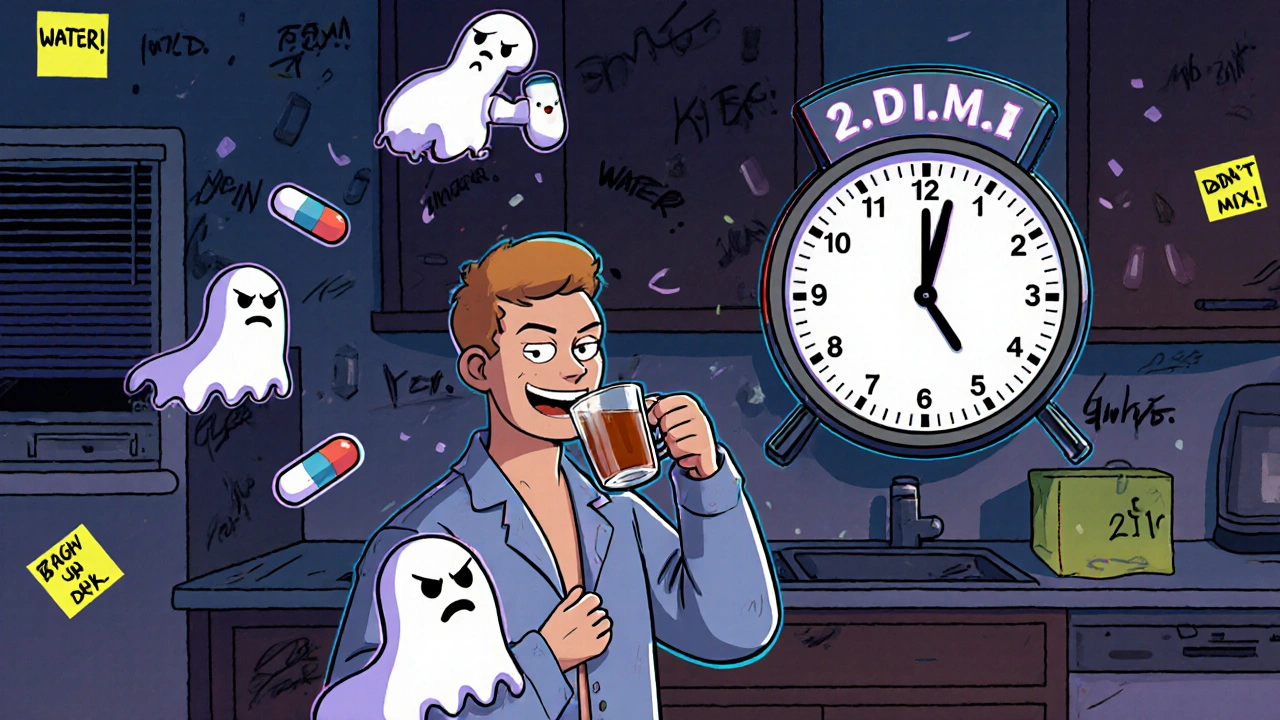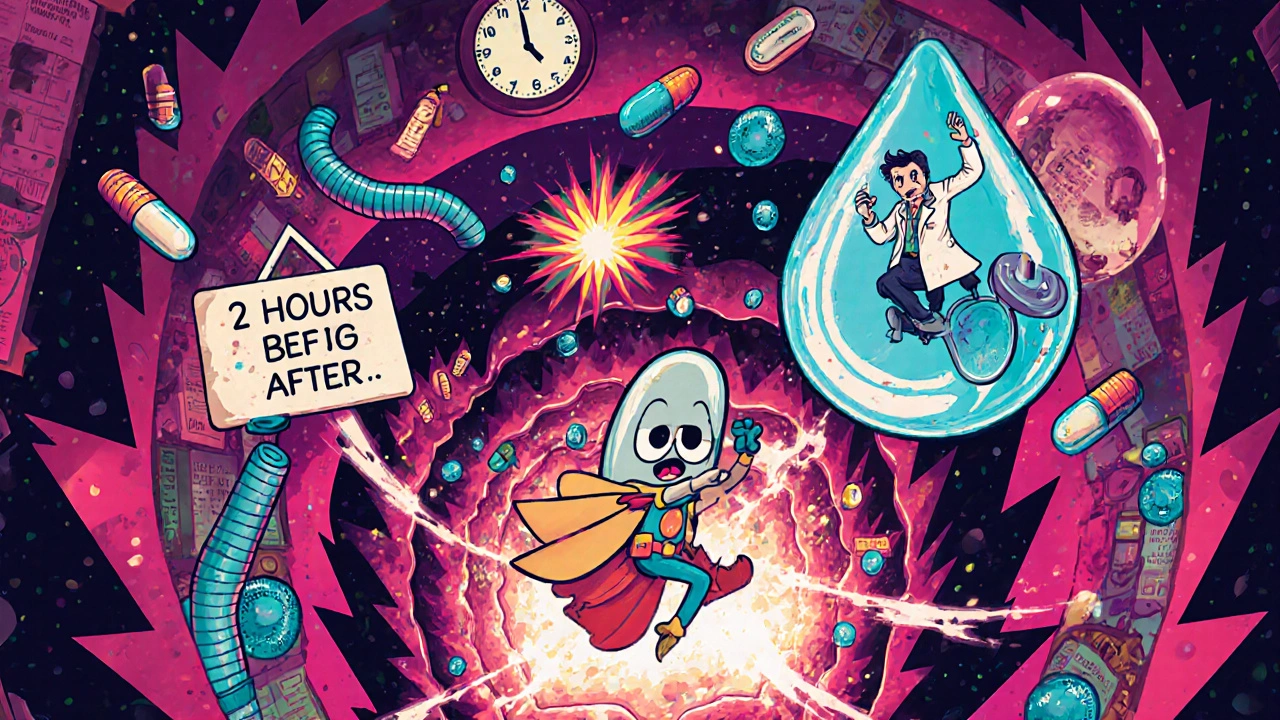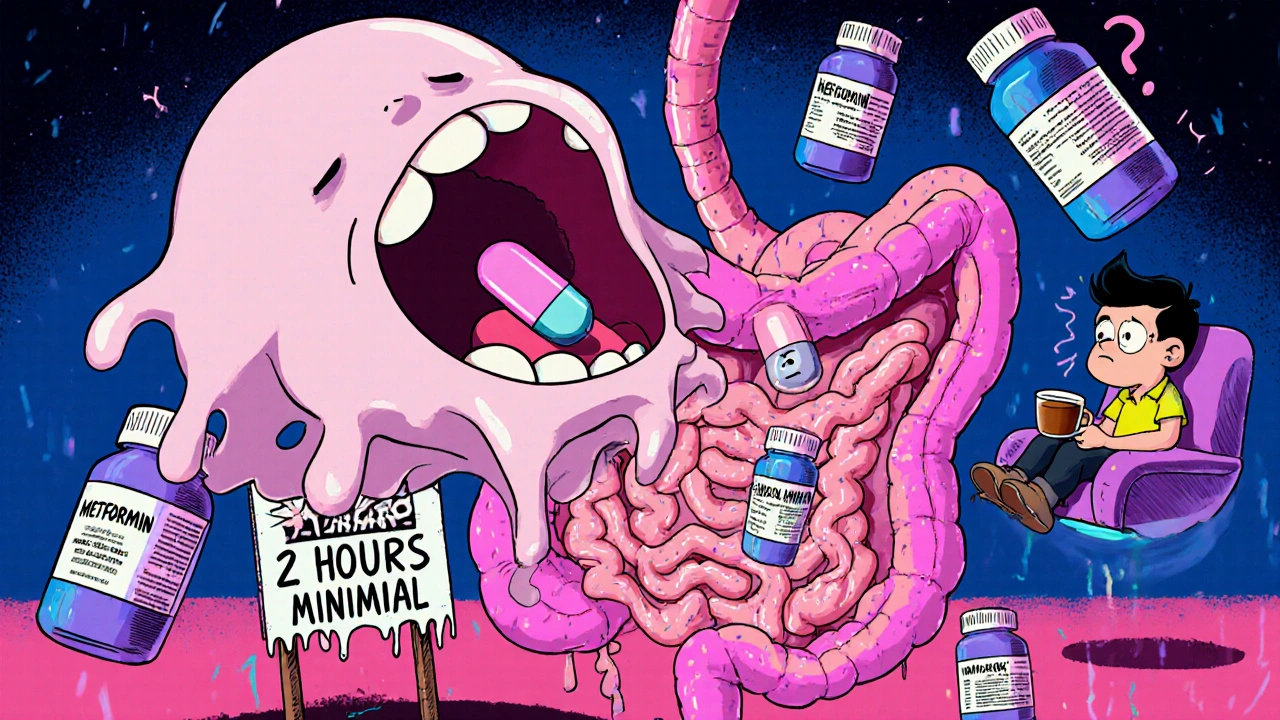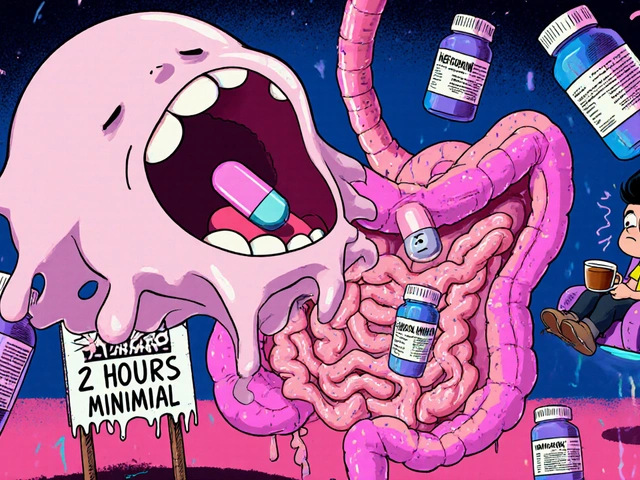Medication-Fiber Timing Calculator
This tool helps you determine the best time to take fiber supplements to avoid interactions with your medications. Follow the 2-hour rule: take fiber at least 2 hours before or after your medications for maximum effectiveness.
Recommended Fiber Timing
Important: Always take fiber with at least 8 fl oz of water.
Warning: If you take lithium, carbamazepine, or other critical medications, watch for signs your medication isn't working properly.
Constipation is one of the most common digestive complaints, and fiber supplements like psyllium are often the first thing doctors recommend. But if you’re taking medications, timing matters-big time. Taking fiber at the wrong time can make your blood pressure pills, diabetes meds, or even antidepressants less effective. This isn’t theory. It’s happening to people every day.
Why Fiber Interferes With Medications
Fiber supplements, especially those made from psyllium husk (like Metamucil), don’t just add bulk to your stool. When mixed with water, they form a thick, gel-like substance in your gut. That’s great for softening stool and easing constipation. But that same gel can trap medications as they pass through your digestive tract, stopping them from being absorbed properly. The American Gastroenterological Association confirms this in their 2023 review: fiber changes how fast food and drugs move through your intestines. If your pill gets wrapped up in psyllium gel, it might not reach the bloodstream at all-or it might be absorbed too slowly. That means your medication won’t work as it should. This isn’t just about one or two drugs. Research shows fiber affects carbamazepine (for seizures), lithium (for bipolar disorder), metformin (for diabetes), and olanzapine (for schizophrenia and depression). If you’re on any of these, you need to plan your fiber intake carefully.When to Take Fiber Supplements
There’s no single answer, but the safest rule is simple: take fiber at least 2 hours before or after your medications. That’s the official advice from Metamucil’s manufacturer and backed by multiple clinical guidelines. Here’s how to make it work in real life:- If you take your meds in the morning-take fiber at lunch or dinner.
- If you take meds at night-take fiber in the morning or early afternoon.
- Avoid taking fiber right before bed. Many users report bloating, gas, and even midnight bathroom trips that ruin sleep.
What Happens If You Get the Timing Wrong?
Skipping the 2-hour window isn’t just risky-it’s common. On Reddit’s r/medication community, 67% of 142 respondents admitted they’d taken fiber and meds together at least once. Over 43% noticed their diabetes meds weren’t working as well. One man reported his fasting glucose jumped from 110 to 180 mg/dL after he started taking Metamucil with his morning metformin. It’s not just blood sugar. People on thyroid meds like levothyroxine have seen their TSH levels rise after mixing fiber with their pills. Lithium levels can drop dangerously low. Carbamazepine levels can fall below the therapeutic range, increasing seizure risk. The UCSF Health team warns: if you start feeling nauseous, have abdominal pain, or notice sudden changes in bowel habits lasting more than two weeks, stop the fiber and call your doctor. These could be signs of something more serious-like a bowel obstruction or diverticulitis flare-up.How Much Fiber Should You Actually Take?
Not all fiber is created equal. Psyllium is the most studied and most effective for constipation. A 2022 meta-analysis in PMC found that people taking at least 10 grams of psyllium daily had 48% better treatment response than those on placebo. That’s more than double the effect of some laxatives. Here’s what you need to know about dosing:- For constipation: 5-10 grams per day, split into 1-2 doses.
- For heart health (lowering cholesterol): 10 grams per day, split into two doses before meals.
- For blood sugar control: 5 grams before each meal, up to 4 times daily.

Water Is Non-Negotiable
Fiber without enough water is dangerous. The U.S. Food and Drug Administration requires all fiber supplement labels to warn: “Take with at least 8 fluid ounces (237 mL) of liquid.” Why? Because dry psyllium can swell in your throat or esophagus and cause choking. Elderly patients and those with swallowing problems are at highest risk. One case study from a Manchester hospital in 2023 involved a 79-year-old woman who developed a partial esophageal blockage after taking her fiber capsule with just a sip of tea. She needed endoscopy to remove it. Always drink a full glass of water with your fiber-and another one 30 minutes later. If you’re on a fluid restriction due to heart or kidney issues, talk to your doctor before starting fiber supplements.What About Other Fiber Sources?
Not all fiber supplements are psyllium. Some use methylcellulose, calcium polycarbophil, or inulin. These don’t form the same thick gel, so their interaction risk is lower-but still present. Inulin, found in many “prebiotic” powders, can cause gas and bloating without helping constipation as much as psyllium. Methylcellulose (like Citrucel) is less likely to interfere with meds, but it doesn’t help cholesterol or blood sugar like psyllium does. If you’re switching from one fiber to another, don’t assume the timing rules are the same. Stick with psyllium if you want proven results-and always follow the 2-hour rule.What If You’re on Multiple Medications?
If you take 5 or more pills a day, planning becomes harder. Here’s a practical trick: Create a simple chart:| Medication | Time Taken | Best Fiber Time |
|---|---|---|
| Metformin | Breakfast, Dinner | Lunch |
| Lisinopril | Morning | Evening |
| Levothyroxine | 6 a.m. on empty stomach | 10 a.m. or later |
| Atorvastatin | Bedtime | 11 a.m. |

When to Stop Fiber Altogether
Fiber isn’t for everyone. If you have:- Severe abdominal pain
- Vomiting
- Rectal bleeding
- Constipation lasting more than 7 days
What’s Next for Fiber and Medications?
Scientists are working on solutions. The European Medicines Agency is tracking timed-release fiber matrices as a “high-potential innovation.” These are capsules designed to release psyllium slowly, so it doesn’t interfere with meds taken hours later. A clinical trial (NCT05678901) is currently testing whether taking psyllium at 11 a.m. gives the best balance-enough time to help digestion without messing with morning or evening meds. Early results look promising. Until then, stick with the proven method: space it out. Two hours before or after. Always with water. Start low. Go slow.Bottom Line
Fiber supplements are one of the most effective, affordable, and safe ways to treat constipation. But they’re not harmless. When mixed with meds, they can turn a life-saving drug into a useless pill. If you’re taking fiber and any prescription medication, don’t guess. Don’t assume it’s fine. Ask your pharmacist or doctor: “When should I take my fiber with my meds?” Write it down. Stick to it. Your body-and your medications-will thank you.Can I take fiber supplements with my morning coffee?
Yes, but only if you take your fiber at least 2 hours before your medications. Coffee itself doesn’t interfere, but if you take pills with your coffee, you need to space your fiber out. Avoid taking fiber in the same drink as your meds-always use plain water and wait the full 2 hours.
Is Metamucil better than other fiber supplements for constipation?
Yes, for most people. Psyllium husk in Metamucil is the most clinically proven fiber for increasing stool frequency and reducing straining. Studies show it works better than methylcellulose or inulin for constipation. It also helps lower cholesterol and stabilize blood sugar, which many other fibers don’t do.
Why do I feel bloated after taking fiber?
It’s normal at first. Your gut needs 1-2 weeks to adjust to extra fiber. Start with one serving a day and increase slowly. Drink plenty of water. If bloating lasts longer than two weeks, gets worse, or comes with pain, stop taking it and see your doctor-it could be a sign of a more serious issue.
Can I take fiber at night if I only take meds in the morning?
Technically, yes-if your meds are all taken in the morning, taking fiber at night gives you more than 2 hours between them. But many people find nighttime fiber causes bloating and disrupts sleep. If you can take it in the late afternoon instead, that’s often a better choice. Listen to your body.
Does insurance cover fiber supplements?
Most U.S. insurance plans treat fiber supplements as over-the-counter items and don’t cover them. But if your doctor prescribes psyllium for a specific condition like IBS with constipation, Medicare Part D may cover it. Always ask your pharmacist to check using your prescription number.
What if I forget and take fiber with my medication?
Don’t panic. One mistake won’t cause harm. But don’t do it again. If you’re on a critical medication like lithium, metformin, or carbamazepine, watch for signs it’s not working-like higher blood sugar, mood swings, or seizures. If you notice anything unusual, contact your doctor right away. In the future, set a phone reminder for both your meds and your fiber.






Cinkoon Marketing
November 21, 2025 AT 11:20So many people just dump psyllium in their morning coffee with their pills and wonder why their blood sugar goes haywire. I’ve seen it a million times. It’s not magic-it’s physics. The gel traps the meds like a sponge. Simple fix: space it out. Two hours. Water. Done.
And yes, Metamucil works better than that fancy inulin powder your yoga instructor swears by. Science > trends.
robert cardy solano
November 22, 2025 AT 04:18Been taking Metamucil for 3 years with my blood pressure med. Never had an issue. Just take it at dinner, meds at breakfast. Easy. People overthink this stuff.
Pawan Jamwal
November 23, 2025 AT 14:58USA got the best medical research in the world 🇺🇸 and yet people still mix fiber with meds like it’s a smoothie? 😒 We have guidelines for a reason. If you can’t follow a 2-hour rule, maybe you shouldn’t be managing your own meds. #AmericanHealthcareProblems
Bill Camp
November 23, 2025 AT 16:08MY BROTHER HAD A SEIZURE BECAUSE HE TOOK METAMUCIL WITH HIS CARBAMAZEPINE. HE WAS IN THE HOSPITAL FOR 11 DAYS. THEY SAID IF THE LEVELS DROPPED JUST A LITTLE MORE, HE WOULDN’T BE HERE. I’M NOT JOKING. THIS ISN’T A ‘MAYBE’ THING. IT’S A LIFE OR DEATH TIMING ISSUE. DON’T BE THAT PERSON.
PLEASE. JUST READ THE LABEL.
Lemmy Coco
November 25, 2025 AT 13:33im usin citrucel now becuz i heard its less likely to mess with meds but im not sure if its as good for constiption… anyone know? also i keep forgettin to drink water after so i get kinda bloated… oops 😅
rob lafata
November 27, 2025 AT 00:51Oh sweet Jesus. Another ‘science’ article written by a pharma shill pretending to care about your gut. You think the FDA gives a damn about your lithium levels? They’re too busy approving 47 new antidepressants that make you gain 50 pounds and forget your own name. Psyllium’s been around since the 1930s. The real danger? Doctors who don’t take 2 minutes to explain this stuff. And corporations selling you ‘prebiotic’ junk for $20 a jar while the real solution costs $5. You’re being played.
And don’t even get me started on ‘fiber matrices’-that’s just Big Pharma’s way of charging you $75 for the same damn psyllium in a fancy capsule. Wake up.
Matthew McCraney
November 27, 2025 AT 22:14EVERYONE KNOWS THE GOVERNMENT PUTS TOXINS IN MEDS TO KEEP US SICK. FIBER SUPPLEMENTS ARE JUST A DISTRACTION. THEY WANT YOU TO THINK YOU CAN FIX YOURSELF WITH A POWDER WHILE THEY KEEP SELLING YOU $500 MONTHLY DRUGS. I’VE BEEN ON A FIBER FAST FOR 6 MONTHS AND MY BLOOD SUGAR IS NOW ‘NORMAL’-WHICH MEANS THEY’RE LYING ABOUT WHAT NORMAL IS. THEY’RE CONTROLLING OUR BOWELS. AND OUR MINDS. AND OUR MONEY.
ALSO MY DOCTOR WON’T TALK TO ME ABOUT THIS BECAUSE SHE’S ON THE PAYROLL. I SAW HER TALKING TO A MAN IN A SUIT AT THE PARK LAST WEEK. IT WASN’T A WALK. IT WAS A HANDOFF.
serge jane
November 28, 2025 AT 23:22It’s interesting how we’ve turned something as natural as fiber into this clinical negotiation with our bodies and our prescriptions. We used to eat it in whole foods-oats, beans, fruits-and our systems adapted without spreadsheets or pill organizers. Now we’re treating it like a chemical compound with half-lives and absorption windows. There’s a loss here. Not just of health, but of trust. We don’t trust our bodies to process food. We don’t trust our doctors to explain it simply. We don’t even trust ourselves to wait two hours.
Maybe the real problem isn’t the timing. It’s that we’ve forgotten how to live gently with our own biology.
Still. Two hours. Water. Start low. Go slow. I’ll take the advice. But I’ll also miss the quiet of eating an apple and letting it do its work.
Nick Naylor
November 29, 2025 AT 08:47Brianna Groleau
November 30, 2025 AT 09:44I’m from the Philippines and we use banana stems and guava leaves for constipation-no powders, no pills. But after moving to the U.S., I started on Metamucil because my doctor said it was ‘the gold standard.’ I didn’t know about the 2-hour rule until my mom called me crying because my uncle had a bad reaction to his thyroid med. I cried too.
Now I take mine at 1 p.m., meds at 7 a.m. and 7 p.m. I set alarms. I drink water like it’s my job. And I tell everyone I meet-especially my coworkers who take 10 pills a day. It’s not just about health. It’s about love. You’re not just taking care of yourself. You’re protecting the people who worry about you.
Rusty Thomas
December 1, 2025 AT 14:48Okay but what if you’re on a keto diet? I’m doing 20g fiber a day from chia and flax and I’m also on metformin and my glucose is still spiking. Is it because I’m not using psyllium? Or because I’m not drinking enough water? Or because I’m just cursed? I’m crying in the bathroom again. Someone please help. I just want to poop and not die.
Also I think my dog knows I’m taking fiber. He’s been staring at me like I’m betraying him. I think he’s judging me.